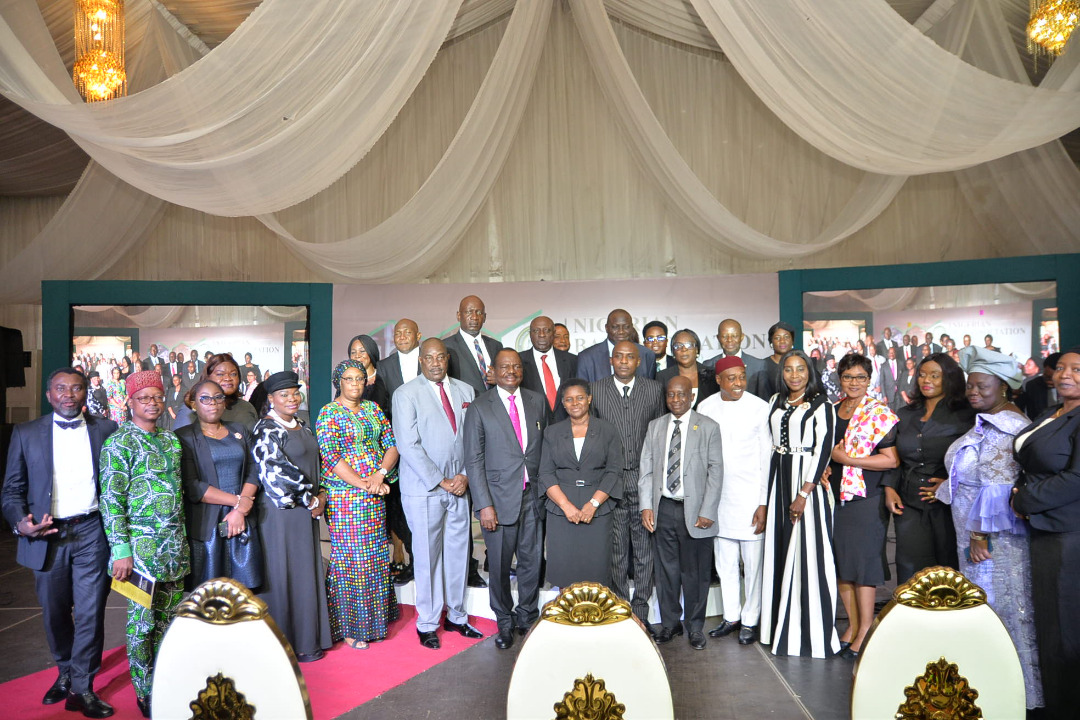Urges that trade unions, student unions and professional bodies should make up the electoral commission
Former Inspector General of Police, Dr. Solomon Ehigiator Arase was Keynote Speaker at the ongoing Lawweek of the Nigerian Bar Association, NBA (Unity Bar) Abuja with the theme, Credible Electoral Process, Rule of Law, Leadership and Good Governance: The Way Forward.
Arase who stressed that Nigerians “must stand up for their rights and say no to the deceit of the power elite” expressed concern about many burning issues. Below are excerpts from the paper.
By the theory of liberal democracy which is adopted by the Nigerian Constitution, the people are expected to elect and control their leaders and demand accountability from them. Rule of law principles enshrined in the Constitution reinforce this practice. Credible elections are therefore a sine qua non for good governance and development.
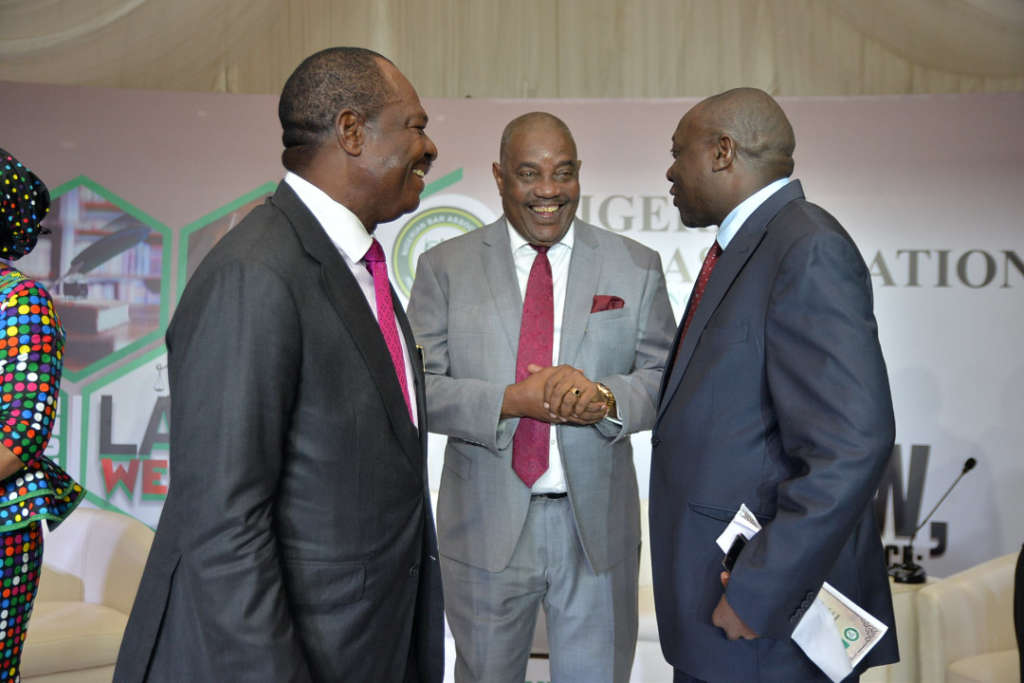
Quoting D, Workin[1], the court in Amechi v INEC[2] stated that “true democracy is not just statistical democracy in which anything, a majority or plurality wants is legitimate for that reason, but communal democracy in which majority decision is legitimate only when it is a majority decision within a community of equals…”
Electoral process, as a component of the rule of law, is an expression that leaders who emerge from this process should engage with rational legal regulations[3]. The essence of election and electoral process is to afford opportunity to the citizens to participate in the choice of their leaders. Such leadership is not, ipso facto, to subvert the electoral integrity of the country, but to abide by rational legal regulations and procedures that are key to democracy and good governance with multiplier effects on development. While it is true that democracy does not guarantee Eldorado or good governance[4], a leadership with the political will to actualise laws will trigger off positive responses from subordinates and the governed leading them to associate more closely with the goals of a society[5].
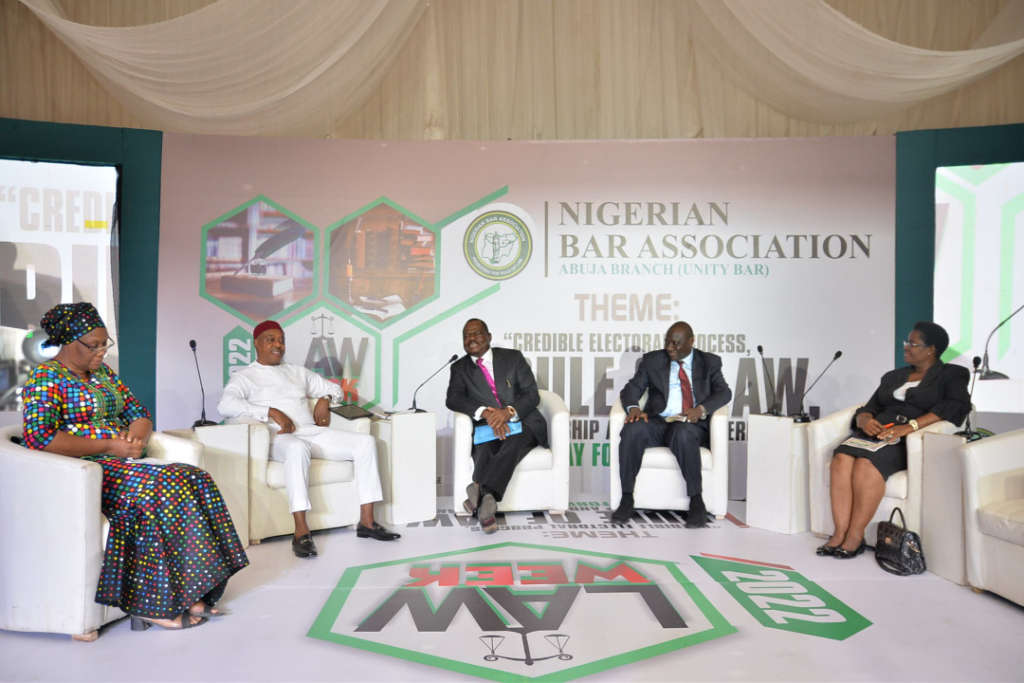
There are prospects of credible elections in Nigeria, however, the emerging challenges must be surmounted to create, at all times, a culture of upholding standards for such credible elections that will usher leadership that will engender good governance and development of the country.
(b) The Way Forward
1. Politicians should desist from conducting politics as a warfare/do-or-die affair, as these make citizens who are supposed to benefit from good governance scapegoats of the democratic process.
2. Elections should be conducted on a free and fair basis, upholding the tenets of the rule of law such that Nigerian citizens are given the fair opportunity to choose their representatives and also to contribute in the policy making process.
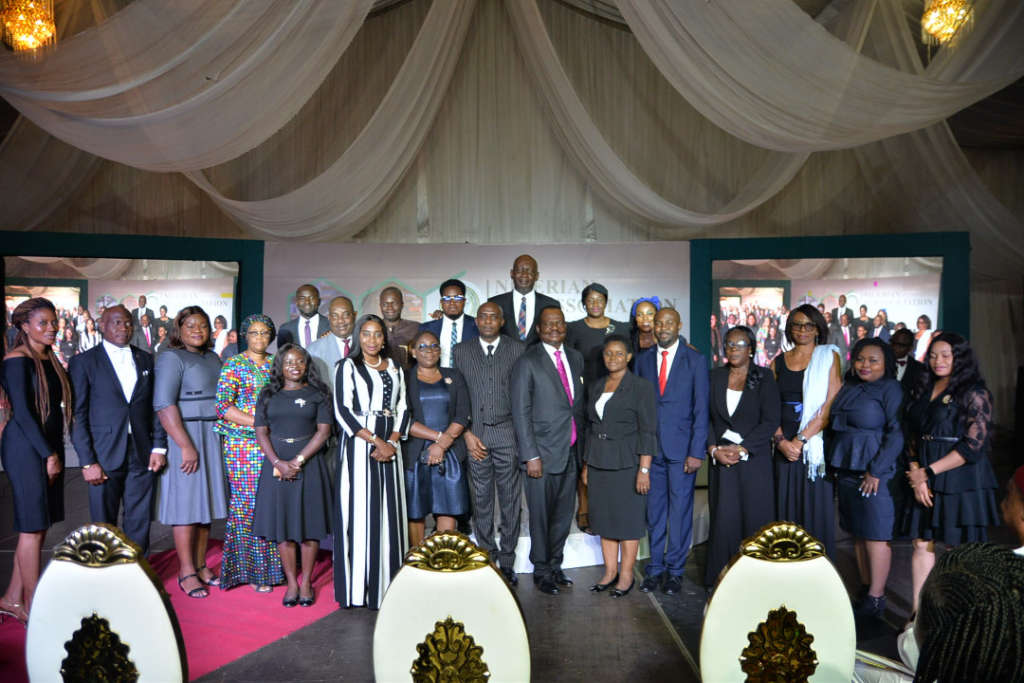
3. Corruption fighting institutions (e.g. EFCC, ICPC) should be strengthened and given the necessary support to bring to book all past political leaders in Nigeria who used state apparatus while in government to accumulate wealth so as to always buy their ways into political offices.
4. Politicians who have ascended into governance must know that they owe the electorates explanations for their current acts. They should see themselves as servants of the people and not the other way round. As such, they should contribute to the stable growth of the economy and the actualization of the needs and aspirations of the citizenry programmes.
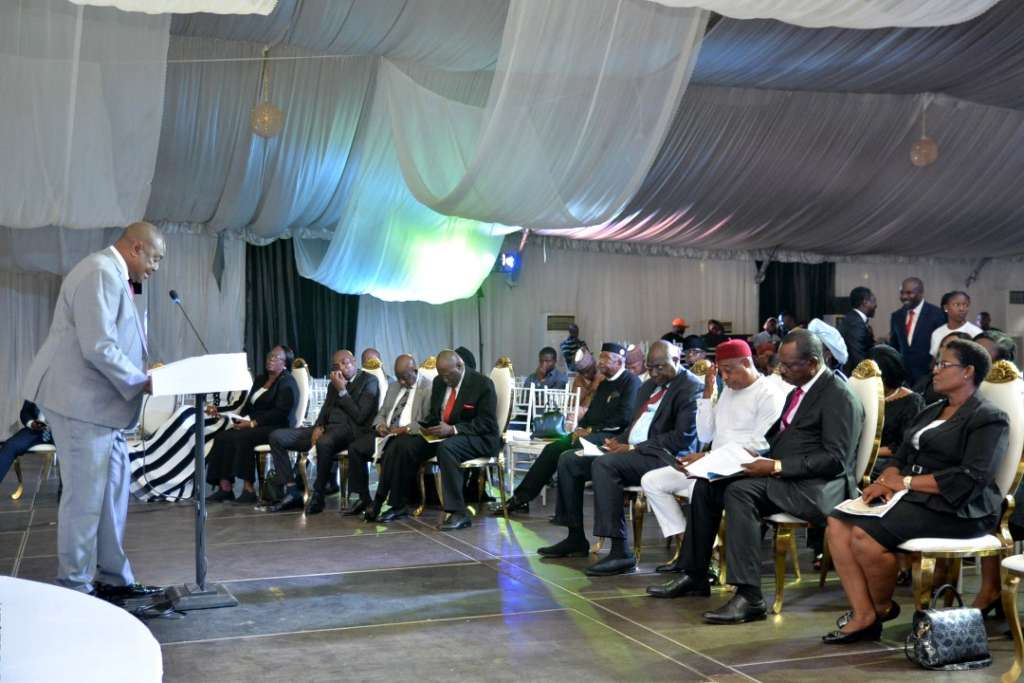
5. Lack of continuity and shift in approach by successive governments trailed socio-economic development programmes in Nigeria as each administration comes in with different ideas.
6. In addition, there is need to improve the process of voter education and political sensitization especially for the young people as they will greatly influence the success of the elections.
7. To reform the conduct of elections and electoral process in Nigeria, something of a radical departure is also required. A legislative framework must be created to make transparency and good governance a necessity. The goals of that radical departure must include:
(a) The completion of the Nigerian independence project by making the country truly united, invisible and indissoluble and for the purpose of promoting good a government and welfare of all persons in the country.
(b) The subordination of the Nigerian state, the ruling class in general and the political class in particular to the will and sovereignty of the Nigerian people.
(c) The creation of a new political class whose defining values will support both democracy and development in Nigeria.
(d) The creation of a politics that is value-driven and therefore truly competitive; that enables the separation between interest groups and their political platforms on the basis of their defining ideologies and hence programmes.
8. There is also the need for political elite to imbibe democratic political culture and conduct their campaigns for public offices at all levels on issues that affect the life of the people, rather than engaging in calumny and self-aggrandizing pursuit.
9. Effort must be made to strengthen voters education, such that the electorate can cultivate the right attitude and be more participative in the democratic process.
10. Political parties must develop a mass based approach. Politics is the struggle for power; and power in democracy belongs to the people.
11. There has to be unity of command in the party leadership. Disciplinary actions must be taken in consonance with party laws.
12. The leadership of the party must be involved in policy articulation, policy-making and implementation in order to keep its government at various levels with the objectives of the party.
13. Members of political parties must learn to develop the spirit of sportsmanship in politics. The game of politics should not be regarded as “do-or-die” battle.
14. A vigilant, articulate, vibrant and well mobilized public should be established. Democracy is nowhere won on a platter of gold. It must be fought for and sometimes won at enormous cost. But in the final analysis, the freedom and liberty of the people gain by determining who governs them could be more precious than the price paid. The people must stand up for their rights and say no to the deceit of the power elite in Africa[6].
15. There should be institutional synergy. The ‘trinity’ of the civil society, security agents and electoral bodies working for common purpose of public good can ensure that elections are free, fair and credible and accord legitimacy to the government of the day.
16. Candidates for office must submit asset declaration forms which will be checked by national and international forensic accountants, with expertise in tracing assets.
17. The judiciary, policy and other institutions must be ruthlessly purged of corrupt officials, and then be given independence from the political class to perform the technical functions for which they were employed.
18. What Nigeria needs at this critical period of her development is really a new culture of governance, sustained by transparency and accountability.
19. On electoral bodies
(a) The INEC should be empowered to live up to its name by being truly independent. This can be achieved by proper funding, early release of funds and amendment to the mode of appointment of the chairman and its national commissioners.
(b) The policy of sending horde of civil servants to compromise the integrity of that commission needs re-examination. INEC must distance itself from all political parties, in order to avoid undue influences; it must set the rules by which all politicians must play the game while it ensures compliance. It should not be seen as a collaborator with the executive of an incumbent government.
(c) INEC must specify the rules prior to an election including modalities for vote count; it must ensure that there is an update of voters register and that its own representatives are available at polling booths. Nigerians should be properly educated on these rules, regulations and procedures.
(d) There should be improvement on the current technology being employed by INEC and adoption of new technological strategies including electronic voting and transmission of election results.
20. There is also the need for attitudinal change by Nigerians. No matter what beautiful laws are put in place, if the people are not willing to obey them, INEC will still fail in the future. The stakeholders in the Nigeria project: politicians and their agents, INEC, security agents, the civil society and the general electorate must decide to be honest and do what is right during elections and report those planning to perpetrate fraud; otherwise the achievement of a free and fair election in Nigeria may be a mirage.
21. The country should ensure access to justice for all as we are in a democratic dispensation.
22. Judiciary should be granted full and actual financial autonomy. The letter and spirit of section 162(9) of the Constitution and by virtue of the Fourth Amendment which came into effect on 7th May, 2018, section 121(3) should be given effect to grant autonomy to the judiciary and the House of Assembly of the State.
23. Minimising electoral violence is a major way forward. Electoral violence persists partly because the prosecution of suspects is hardly completed. Electoral violence may be attenuated on the basis of adoption of the following policies, among others:
- Decentralisation of the policing system such that there is not only state-controlled police but also local government-controlled police on the condition that the police institution is subjected to a system of democratic control by community-based security committees comprising representatives of communities, representatives of sectional groups in each community such as student unions, trade unions, central labour organisations and relevant professional bodies such as the Nigeria Bar Association (NBA). There should be a full exercise of trade union rights by members of the Nigeria Police Force, so that trade union pressure may be brought to bear on the definition of lawful orders that may be carried out.
- There should be a change in the mode of appointing the Inspector-General of Police (IGP). Election of the police bosses such as the I.G.P. and the Commissioners by the rank and file of the police has been suggested. A method of appointment which makes the IGP to be independent of too much control by the appointor or his agents is also another suggestion.
- Insistence on the prosecution of violent-prone behavior/individuals in order to show in practice that there are no sacred cows and that every person is equal before the law.
24. Economic empowerment of ordinary people and judicial officers should be carried out relentlessly.
25. Judges who handle elections petitions should be well remunerated.
26. Use of Rate of Remuneration payable to political office holders and lack of access to contract awards as disincentives for electoral fraud and violence should be enshrined in the electoral laws. A policy ought to be developed to ensure that preparedness for selfless service rather than the likelihood of material benefit is the primary motivation for contesting elections. The remuneration of elected public officials should therefore be within the salary structure for public sector workers. Similarly, legislation should be made banning office holders, their friends, relations and agents, from taking government contracts.
These measures are similar to what obtains in Germany where as Walecki points out, German cabinet members are prohibited from earning anything other than their salaries[7]. Walecki also shows what happened to cabinet members who violated similar policy in Japan: Kimitaka Kuze, head of Japanese Financial Reconstruction Commission, was forced to step down in July 2000 following revelations that he had received nearly US$2. I m from Mitsubishi Trust and Banking corporation between 1989 and 1994. Even in Africa, Nyerere’s TANU adopted similar policies in Tanzania.
Adopting and enforcing similar measures as stated above in Nigeria would go a long way in reducing, not only electoral violence and fraud, but also the tendency for corruption in public office.
27. Multiplicity of political platforms as a way of ensuring free and fair election should be encouraged. One of the sources of tension at election periods is limited choice made available to the electorate. Though the Supreme Court had to compel INEC to register as many political parties that satisfied the Constitutional conditions for registration during the 2003 elections, it must be realised that some of the constitutional conditions are illiberal. For example, Section 221 of the Constitution bars associations other than political parties registered under Sections 222 and 223 from canvassing for votes or sponsoring candidates for elective positions. This also implies a ban on independent candidacy. In the same vein, Section 222(1) requires that the National Headquarters of registered political parties must be established in the Federal Capital Territory, Abuja, while Section 223 (b) requires that members of the National Executive Committee (NEC) of a party to be registered must come from two thirds of the states of the Federation. The import of these requirements is that to function, a party must have national character. The Constitution does not provide room for issue-based parties, which could be restricted to just an electoral ward or local government. The above constitutional requirements tend to overstretch small parties and Put unnecessary burden on them to the extent that they are usually unable to have agents to monitor elections at booths!
28. Mode of composition of INEC commissioners should be reformed. Under Section 154(1) of the 1999 Constitution, the President, subject to confirmation by the Senate, appoints the Chairman and members of Federal Executive Bodies, which include 1NEC Chairman and the other 12 Commissioners. However, the President appoints the Resident Electoral Commissioners for each of the states of the Federation without recourse to any arm of the National Assembly[8]. The Secretary to INEC was usually formerly transferred from the office of the Presidency, but the present one has been a core staff of the Commission. This policy should be sustained.
The existing Constitutional provisions for appointing umpires for elections cannot guarantee free and fair elections. Rather, representatives of all political parties and nationally recognised mass organisations, such as trade unions, student unions and professional bodies should compose the electoral commission.
Alternatively, a system of electing such bodies should be worked out, in order to ensure the independence of INEC in both name and practice. The existing mode of appointing INEC Commissioners has made it possible for the emergence of characters who lack a track record of independent- mindedness and standing for principles.
29. Political parties should be sanctioned and continue to be sanctioned for failure to meet constitutional and legislative provisions as well as INEC guidelines, for example, failure to field any candidate during general elections; failure to win at least 5% of votes at any general elections; failure to maintain and operate at least an office in the Capital Territory (FCT) and that there should be a time limit ‘within which Registration of Political Parties can be commenced and concluded’ contrary to constitutional provision which places no time limit[9]. Deregistration of parties should be the sanction for the above-listed ‘failures’ of parties.
30. Systematic and continuous updates of voters register should be undertaken. The sampling frame for elections is the voter’s register. Without a credible voters register, there can be no credible elections. This is why the Constitution in the Third Schedule, Part 1, Item 15(e) empowers INEC to ‘arrange and conduct the registration of persons qualified to vote and prepare, maintain and revise the register of voters for the purpose of any election under this Constitution. But this Constitutional mandate is never carried out regularly. INEC itself had once admitted the disenfranchisement of millions of persons eligible to vote simply because it lacked the funds to carry out the voters registration exercise comprehensively.
In this age of Internet, voters list should be made widely available on the net in order to remove possibilities of manipulations at different levels. Without public access to the voters register, elections could be liable to being manipulated.
31. Candidate at an election whose victory is being challenged in court should not be sworn in until the court determines the case. Such a provision will minimise pressure on the judiciary by a President-elect or Governor-elect and their political parties; once they are allowed to settle down and stabilise, it becomes much more difficult. Such a judge or panel of judges who declares the election of a sitting Governor or President invalid may in turn be declared state security risk.
32. Enforcement of legal provisions concerning elections including those on party/candidate funding and limits to election expenses should be strictly and regularly carried.
33. The under-representation by women in governance should be discouraged. They (women) should be encouraged and supported so that they can also contribute maximally in governance of the nation. In fact, there is need for a realistic implementation of the United Nation Convention on Elimination of all forms of Discrimination against Women (CEDAW) as well as Nigerian laws to engender fairness and equity in governance and public spheres in the nation.
[1] Workin, R. D. “Bill of Rights for Britain, 1990, pp. 36.
[2] Supra.
[3] Zack-Wiliams, T. “African Leadership, Nation State and the Weberian Project”, The Constitution, vol. 8, No. 1, March 2008, p. 20 where the view was expressed that African leaders fail to have this kind of engagement.
[4] Uhunmwhangho, A., “Electoral Fraud and Other Malpractices in Nigeria The Way Out”, The Constitution vol. 8, No. 1, March, 2008, p. 31.
[5] Zack-Williams, ibid.
[6] Suberu R., “Can Nigeria’s New Democracy survive”? Current History: A Journal of Contemporary World Affairs, May, 2001-2007.
[7]Walecki, M., “Political Money and Political Corruption: Considerations for Nigeria. Paper delivered at the INEC-Civil Society Forum Seminar, 27-28 November 2003, p. 2.
[8] See Third Schedule, Part 1, item 14(2)(a)
[9] INEC: suggested Issues for Reform. Paper delivered on behalf of INEC by Prof. Maurice Iwu at the INEC-Civil Society Forum Seminar, 27-28 November 2003.

